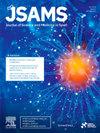急性对乙酰氨基酚摄入可改善模拟足球比赛后神经肌肉疲劳的恢复。
IF 3
2区 医学
Q1 SPORT SCIENCES
引用次数: 0
摘要
研究目的本研究旨在探讨急性对乙酰氨基酚摄入对模拟足球比赛后 72 小时恢复期间神经肌肉功能反应、肌肉损伤生物标志物和体能表现的影响:研究采用交叉随机、双盲、安慰剂对照试验设计:在两次实验过程中,13 名半职业男子足球运动员在口服 1 克对乙酰氨基酚或安慰剂 60 分钟后,完成了一场 90 分钟的模拟足球比赛。通过股神经电刺激引起膝关节伸肌的最大自主收缩和抽搐反应,以评估外周疲劳(增效抽搐力 Qtw,pot)和中枢疲劳(自主激活)。通过反向运动跳跃和 20 米冲刺测试对运动表现进行评估。此外,还测量了肌酸激酶和乳酸脱氢酶:结果:与安慰剂相比,对乙酰氨基酚可在模拟足球比赛后立即降低最大自主收缩率(-13.3 ± 7.5 % vs. -24.7 ± 11.1 %)和自主激活率(-3.8 ± 4.4 % vs. -12.9 ± 5.4 %)(p 结论:本研究结果表明,对乙酰氨基酚可在模拟足球比赛后立即降低最大自主收缩率(-13.3 ± 7.5 % vs. -24.7 ± 11.1 %)和自主激活率(-3.8 ± 4.4 % vs. -12.9 ± 5.4 %):本研究结果表明,运动前 1 小时急性摄入 1 克对乙酰氨基酚可减轻运动后最大自主收缩和自主激活水平的下降,并提高 20 米短跑成绩。本文章由计算机程序翻译,如有差异,请以英文原文为准。
Acute acetaminophen ingestion improves the recovery of neuromuscular fatigue following simulated soccer match-play
Objectives
This study aimed to investigate the impact of acute acetaminophen ingestion on the responses of neuromuscular function, biomarkers of muscle damage, and physical performance during the 72-hour recovery period following simulated soccer match-play.
Design
The study followed a crossover randomized, double-blind, placebo-controlled trial design.
Methods
During the two experimental sessions, thirteen semi-professional male soccer players completed a 90-minute simulated soccer match, 60 min after oral ingestion of 1 g acetaminophen or placebo. Maximal voluntary contraction and twitch responses of the knee extensor muscles, elicited through electrical femoral nerve stimulation, were utilized to evaluate both peripheral fatigue (potentiated twitch force, Qtw,pot) and central fatigue (voluntary activation). Performance was assessed through countermovement jump and 20 m sprint tests. Creatine kinase and lactate dehydrogenase were also measured.
Results
Smaller reductions were observed in maximal voluntary contraction (− 13.3 ± 7.5 % vs. − 24.7 ± 11.1 %) and voluntary activation (− 3.8 ± 4.4 % vs. − 12.9 ± 5.4 %) in the acetaminophen compared to the placebo condition immediately after simulated soccer match-play (p < 0.05). Afterward, these parameters were recovered 24 h earlier in the acetaminophen session compared to the placebo session. Furthermore, the 20 m sprint performance was significantly better throughout the recovery period in the acetaminophen session compared to the placebo session.
Conclusions
The findings of this study showed that acute ingestion of 1 g of acetaminophen (1 h before exercise) attenuated the decrease in maximal voluntary contraction and voluntary activation levels after exercise, as well as improved 20 m sprint performance.
求助全文
通过发布文献求助,成功后即可免费获取论文全文。
去求助
来源期刊
CiteScore
7.40
自引率
10.00%
发文量
198
审稿时长
48 days
期刊介绍:
The Journal of Science and Medicine in Sport is the official journal of Sports Medicine Australia (SMA) and is an an international refereed research publication covering all aspects of sport science and medicine.
The Journal considers for publication Original research and Review papers in the sub-disciplines relating generally to the broad sports medicine and sports science fields: sports medicine, sports injury (including injury epidemiology and injury prevention), physiotherapy, podiatry, physical activity and health, sports science, biomechanics, exercise physiology, motor control and learning, sport and exercise psychology, sports nutrition, public health (as relevant to sport and exercise), and rehabilitation and injury management. Manuscripts with an interdisciplinary perspective with specific applications to sport and exercise and its interaction with health will also be considered.

 求助内容:
求助内容: 应助结果提醒方式:
应助结果提醒方式:


